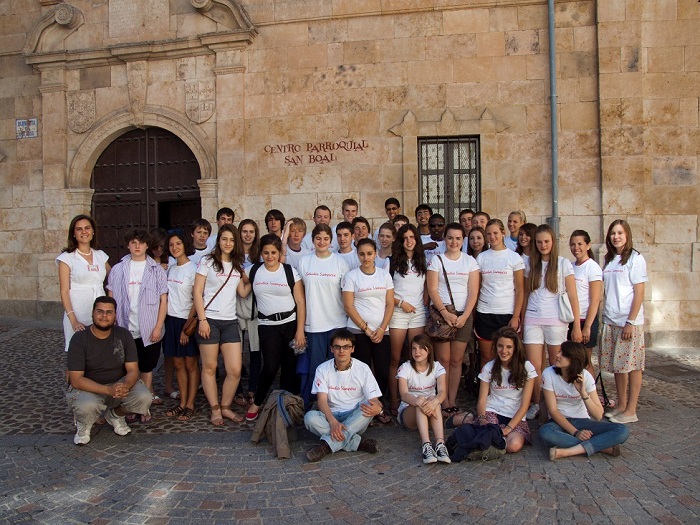Considering a study abroad program during high school, and curious how to gain and transfer class credits? This is one of the key questions we get from interested students, and is definitely something you’ll want to make sure is organized before you depart for our study abroad adventure.
While this can be one of the most challenging tasks in the application process, with a bit of persistence, planning, and the help of our alumni advice below, you can successfully navigate your school’s criteria to make sure your study abroad program doesn’t delay your high school graduation timeline.

A Variety of Options for Gaining Credits Abroad:
There isn’t necessarily one specific way of getting credit while you’re abroad because every U.S. school handles international credit differently. Some schools are really open to cultural exchange programs and make it easy for their students, while others show more resistance and hesitation.
We’ve seen people do a variety of different configurations to make their credits transfer from an international school to back home including:
- Transferring credits directly to equivalent courses your U.S. school offers
- Counting credits gained abroad as general elective credits
- Independent study credit
- Taking summer classes to make up for lost credits
- Opting for online classes during their program to stay on track
If your school is being challenging, don’t give up! Although summer study abroad programs are gaining popularity across the country, less than 1% of U.S. students per year study abroad. Unfortunately, this means many schools haven’t had to outline a process or policy for transferring international credits.

How to Plan Ahead and Be Prepared
The good news though is that many of our students who have studied abroad are the first students at their school to participate on a high school exchange program — you could be that trailblazer! Here’s how to get started to get support from your school and graduate on time.
1. Meet with Your Guidance Counselor or School Administration Early in the Process
One of the best ways to ensure that you will gain credit during your international exchange program is to immediately connect with your guidance counselor. Speak with them early in the research process and communicate often to make sure you are on track! We’ve seen freshman sit down with their counselors to plan for a study abroad program their junior year. If you are really passionate about going abroad, it’s never too early to start planning.
2. Ask for General Curriculum Guidelines of Where You Want to Study
Heading into the meeting with your counselor or administrator, you should probably bring along the general curriculum guidelines of your host country (which Greenheart Travel can provide you). Although we can’t guarantee enrollment in specific courses, our curriculum guidelines will list the types of courses that are typically offered abroad so you can consult with your school about the credits they will potentially grant you for your time abroad.
3. Know What Classes You Need to Graduate and Form a Plan
It is important that you arrange to take any classes required for graduation, such as U.S. History or U.S. Government, before or after your time abroad. It’s also important to outline any additional classes you need for credits that are hard to replicate, such as Health or American Literature, and schedule them accordingly.
If possible, you can try to get ahead on credits by taking summer courses or online courses to avoid the stress of having to transfer credits once you return. The curriculum will vary in every country, so please be aware that a class you take abroad may not cover the same information as the same named class you would take in the U.S. For instance, in Spain “Math” includes Algebra, Geometry, and Trigonometry.
“A tip I would give exchange students is to give the study abroad school the curriculum of the classes they would have had taken at home so they could be placed in classes closest to them in their foreign school.” — Claudia Ray , High School Abroad in New Zealand Alumna

What Worked for Our Greenheart Travel Alumni?
Proving Your Academic Work Ethic Abroad
While it can be easy to slack off in class due to a lack of language understanding and a bit of culture shock, keeping up with your studies as best you can will help you successfully transfer your credits. Most of your courses will be graded as “pass/fail” but you could also try highlighting your best projects or papers from your exchange program as supporting proof of your coursework.
“When I turned in my Spanish transcript and the sheet of paper requesting my classes for this next year, they gave me full credit for my time abroad! What I think helped them realize I deserved full credit was that I passed all of my classes in Spain. If I hadn’t, I probably wouldn’t have gotten a credit for the classes I didn’t pass.” — Louise Plever, High School Abroad in Spain 2017 Alumna

Understand Your School System’s Requirements and Don’t Take No for an Answer
What makes transferring credits challenging, is that there is no one set of guidelines. Every school has its own policy, not to mention additional state laws you might need to navigate. Having some knowledge on possible pain points for your school or guidance counselor can help you be proactive on providing documents and information to support your efforts in studying abroad. If you find yourself with a particularly hesitant counselor or educator, don’t give up.
“Contact your student’s guidance councilor and try to work with them. If you have a problem with the bureaucracy, go up the chain — and keep going up if you need to! We went all the way to the district Superintendent. It was stressful, but we had to understand their perspective and try to work within the system. Thankfully in the end, it is possible and worked out for us. My son was the first student in our district to study abroad!” — Cris Arens, parent of Max Ibata-Arens, High School Abroad in Italy 2017 Alum

Negotiate Class Schedules or Program Lengths that Keep You on Track to Graduate
Sometimes, your school just won’t budge on approving a study abroad program. At this point, it is worth trying to negotiate a shorter length program, such as a trimester or semester international exchange. If your school is supportive, but worried about your credits, be prepared to take extra classes, complete an online course, or register for summer classes to stay on track to graduate. For a life-changing experience though, these extra efforts are worth it.
“I thought I would have a harder time as no one had studied abroad recently at my school at all. But my principal was very understanding, with the agreement that I would need to take more classes or have a busier schedule when I got back. Ultimately, I could get credit for my classes as long as they would be similar to the classes I would be taking at home.” Camden Polzin, High School Abroad in United Kingdom Alumna
What To Do While You Are Abroad to Keep Track of Your Credits?
You’ve been approved and are ready to embark on your study abroad adventure. It can be easy to overlook the details of transferring credits once you return home, but there are steps you still need to take.

Document Your Class Schedule for Your Records
When you arrive in your host country, record a detailed list of your class schedule including subjects, amount of hours per subject, a brief synopsis of the class, etc. Ask your teachers to sign the form to guarantee it will be seen as legitimate by your home institution. Keep one copy for your records, send one copy to Greenheart Travel, and send one copy to your U.S. high school.
Inquire about Your Grading System in Your Host School
On the first or second day abroad, you should ask a school official if it is possible to receive grades or a certificate of attendance. Please keep in mind that the grading system in other countries is different than the U.S. Most host schools will not grant grades or transcripts as it is too difficult to evaluate your work due to the language barrier. If your host school is able to award you grades, they won’t be an exact match to what you would get in the U.S.
Gather Your Documents Before Returning Home
It is your responsibility to acquire official documents confirming your academic work before you leave your host country. Greenheart Travel cannot obtain grades, transcripts, or confirmation of attendance from host schools. Keep all the school work you complete while abroad, so you can hand it in to your teachers upon your return home.
If you have formed a good relationship with a teacher, community leader, local coordinator, etc., ask them for a letter of recommendation. It will be your responsibility to translate it into English and ask them to sign the translated copy. You can include this document with your college applications.

What To Do Once You Return Home?
Ultimately, the decision of whether to grant grades/transcripts is entirely in the hands of your U.S. high school. Schedule a meeting with your guidance counselor and teachers when you return home. Share your course material, so they can determine the credit they will grant for the work you completed abroad.
While this process can feel daunting and often out of your control, with planning and consistent communication, you don’t have to compromise your dream to study abroad. Not only will you be able to use this learning process for college applications, you will be a leader and trendsetter enabling future exchange students to pursue their dream of international education.

Great info, thanks for sharing this!